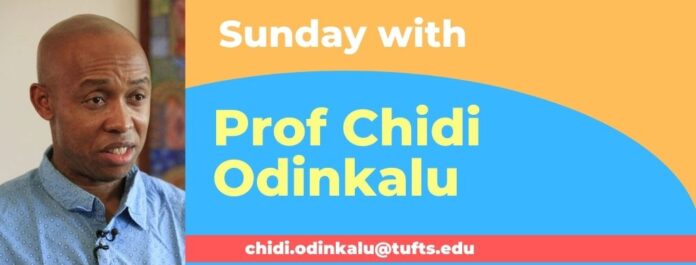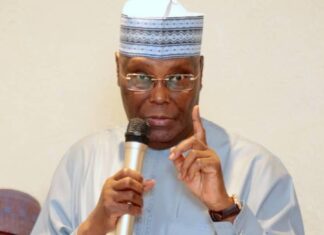In Senegal, Macky Sall’s ambitions stalled in the face of many factors. He could not rely on the army, he had no overwhelming foreign backers and Senegal’s fragility was becoming evident in the face of stout popular resistance. In the end, the people forced him to back down. The plaudits here clearly belong to the people of Senegal.

President Macky Sall of Senegal
On July 3, 2023, Senegal’s president, Macky Sall, in power since 2012, publicly renounced his aspiration for a constitutionally prohibited third term, sparking a synchronized outbreak of ostentatious back-slapping. Nigeria’s former president, Goodluck Jonathan, convener of the impressively-named, West African Elders Forum (WAEF), fired off a letter describing Macky Sall as a paragon of “sacrificial leadership.” Chairperson of the Commission of the African Union, Moussa Faki Mahamat, was full of “admiration for statesmanship which privileged Senegal’s interests.”
Describing President Sall’s announcement as an act of “courage, humility, and deep faith in Senegalese democracy”, Executive Director of UNAIDS, Winnie Byanyima, claimed that he had told her in confidence two years ago that “he was not going to run for a third term but that he would announce this towards the end of his term.”
Ms. Byanyima did not say whether President Sall had also told her that he would wait for enough Senegalese to die on the altar of his presidential vanities before renouncing them. Her testimony had a tiresomely Pentecostal whiff to it.
In announcing the renunciation of his ambitions, Macky Sall claimed that Senegal’s constitution, whose text is explicit to the contrary, would have permitted his violation of it. He sounded deflated and he was. President Sall’s hitherto undisguised ambitions had already killed “dozens” in popular resistance and protests. The latest, at the beginning of June 2023, led to the killing of between 16 to 30 protesters.
In the end, the people forced him to blink. In his campaign to succeed himself, Macky Sall’s party had procured paid demonstrations in support of his ill-fated ambition. But, ahead of his announcement, opposition leader, Ousmane Sonko, whom Sall seeks to preclude from next year’s ballot, had called out the country to mass action.
Senegal’s citizens were determined to make the price of Sall’s self-succession ambition impermissibly prohibitive. The Council on Foreign Relations rightly described Sall’s disavowal of his ambition as rather “belated”.
Macky Sall’s self-succession put Senegal’s proud record of democratic exceptionalism in West Africa to test and is a rare instance of failure in Africa’s new brand of constitutional coups. In retrospect, events in Dakar this past week show that while the optics of the region’s democratic landscape may appear different, the narcissism of political power remains durable.
On May 28, 1975, the rulers of 15 countries in West Africa concluded a summit in Lagos, then capital of Nigeria, with the adoption of the Treaty of the Economic Community of West African States, ECOWAS. It established a regional economic community among the 15 countries, with an undertaking to shrink the zone of sovereign prerogative that they could claim at a time when relations among Africa’s rulers were defined by mutual suspicion and a mutual trade in accusations of interference or subversion.
READ ALSO: A half century of banditry in Nigeria
For proof of this then existing trend, you only had to look at the composition of the rulers who established ECOWAS. Their host was Yakubu Gowon, Nigeria’s then Head of State, a dashing four-star General since the age of 34, who was barely 40. Basking in the after-glow of the accomplishment that the establishment of ECOWAS clearly was, General Gowon traveled to Kampala, Uganda, two months later in July 1975 for the 12th Summit of the Organization of African Unity (OAU). It was his last. Gowon’s host in Kampala was Idi Amin Dada, another soldier and Uganda’s then ruler, who had chosen to go one better than Gowon by gratifying his vanities with the epaulettes of a Field Marshall.
While he was in Kampala, soldiers back home in Nigeria, led by Murtala Mohammed, then a Brigadier-General in the Nigerian Army, decided to relieve Gowon of his command and overthrow him. Nanven Joseph Garba, the army colonel who announced the coup, was Gowon’s kinsman who also commanded the Brigade of Guards responsible for the protection of the Head of State.
Yakubu Gowon was not the only soldier at the creation of ECOWAS in 1975 nor was he the only one overthrown by them. Six others among the 15 original signatories to the treaty were soldiers, including: Lt-Col Mathieu Kérékou (Benin); Gen. Ignatius Acheampong (Ghana, represented by Lt-Col RJA Falli, Minister for Economic Planning); Col. Moussa Traoré (Mali, represented by Major Baba Diarra, Vice-Chairman of the Military Committee of National Liberation); Lt-Col. Seyni Kountché (Niger); Gen. Gnassingbe Eyadema (Togo), and Gen. Aboubakar Sangoulé Lamizana (Upper Volta, now Burkina Faso)
Of the remaining eight, Presidents Dawda Jawara (Gambia); Sekou Toure (Guinea); Luiz Cabral (Guinea Bissau); William Tolbert (Liberia); Moktar Ould Daddah (Mauritania); and Siaka Stevens (Sierra Leone) were all succeeded by soldiers. President Felix Houphöuet-Boigny of Côte d’Ivoire was the only president as such among the original signatories who was neither a soldier nor directly succeeded by one. Abdou Diouf who represented Senegal at the adoption of the treaty was then Prime Minister to President Leopold Senghor, whom he later succeeded as president on April 1, 1981.
Looking back at that era from the vantage of nearly five decades later, the appearance of progress in the optics of government in West Africa looks assured. Mauritania is no longer part of ECOWAS but Cape Verde, which joined in 1976, ensures that the regional bloc remains comprised of 15 members.
In the half century to 2004, West African countries witnessed “169 military interventions of some sort”. The only countries spared this scourge were Cape Verde and Senegal.
Today, in 12 countries out of 15 among the member states of ECOWAS, the head of state by whatever name called, enjoys democratic legitimacy. The only countries presently exempt from this trend are Burkina Faso, Guinea, and Mali, where the military installed themselves in power in coups organized within the past three years.
Impressive as this picture may look, it flatters the region in many ways. First, soldiers in military fatigues may no longer be fashionable in seats of power, but soldiers in many countries in the region are not far from power. Umaro Sissoco Embaló, the current president of Guinea Bissau and Julius Maada Bio, his peer in Sierra Leone, are both former army Generals. Muhammadu Buhari, another General who led the military to overthrow Nigeria’s elected government on December 31, 1983, only recently completed another tour of duty on May 29, 2023 as head of state of his country. They may have shed their fatigues, but soldiers continue in many African countries to enjoy historical advantages in the contest for political and economic power.
Second, coups are no longer the monopoly of soldiers. Civilians or incumbents with appearance of electoral legitimacy now also implement what have been called constitutional coups by manipulating constitutions, courts, and election management bodies to destroy constitutional guardrails and keep themselves in power for as long as they please. In West Africa, the rulers of Côte d’Ivoire and Togo, for instance, have changed their constitutions in this way. In Guinea, soldiers found their excuse to launch a bid for power in fatigues after Alpha Conde, a civilian president, overthrew the constitution in a bloody exercise in 2021 to extend his tenure as president.
Third, these efforts to subvert constitutional rule in the region, whether by the military or civilians, are often accompanied by foreign support. Around Africa, Russia is a rising new force for autocracy and coups. In West Africa, Russia’s footprint has been active in the overthrow of constitutional government in Burkina Faso, Guinea, and Mali. Beyond the region, its friendly presence has also been reported in Burundi, Central African Republic, Comoros, Sudan, Zimbabwe, among others.
In Senegal, Macky Sall’s ambitions stalled in the face of many factors. He could not rely on the army, he had no overwhelming foreign backers and Senegal’s fragility was becoming evident in the face of stout popular resistance. In the end, the people forced him to back down. The plaudits here clearly belong to the people of Senegal. For Macky Sall, he will spend the remainder of his presidency seeking post-presidential immunity. He will need it.
- A lawyer and a teacher, Odinkalu can be reached at chidi.odinkalu@tufts.edu













